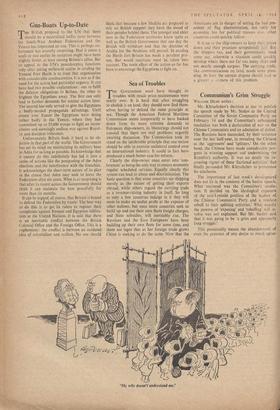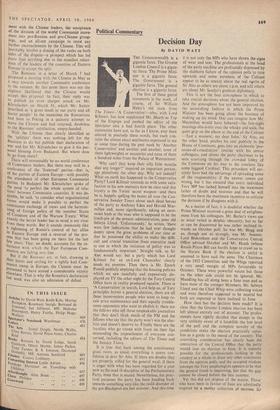Communism's Grim Struggle
WILLIAM DEAN writes: Mr. Khrushchev's decision at last to publish the speech made by Mr. Suslov to the Central Committee of the Soviet Communist Party on February 14 and the Committee's subsequent resolution was both a declaration of war on the Chinese Communists and an admission of defeat. The Russians have succeeded, by their reticence over the last half-year, in revealing the Chinese as the 'aggressors' and 'splitters.' On the other hand, the Chinese have made considerable pro- gress in winning support and undermining the Kremlin's authority. It was no doubt the in- creasing vigour of these 'factional activities' that finally persuaded Mr. Khrushchev to pronounce his anathema.
The importance of last week's development does not lie in the contents of the Suslov speech. What mattered was the Committee's resolu- tion. It decided on 'the ideological exposure of the anti-Leninist position of the leaders of, the Chinese Communist Party and a resolute rebuff to their splitting activities.' What exactly the process of 'exposing' and 'rebuffing' will in- volve was not explained. But Mr. Suslov said that it was going to be 'a grim and apparently long struggle.'
This presumably means the abandonment of even the pretence of any desire to reach agree- 'My wife doesn't understand me'
ment with the Chinese leaders, the acceptance of the division of the world Communist move- ment into pro-Russian and pro-Chinese group- ings, and an all-out campaign to resist any further encroachments by the Chinese. This will inevitably involve a closing of the ranks on both sides of the dispute—a prospect which has led more than anything else to the manifest reluct- ance of the leaders of the countries of Eastern Europe to accept the split.
The Russians in a letter of March 7 had proposed a meeting with the Chinese in May as a step towards another Communist conference in the autumn. By this point there was not the slightest likelihood that the Chinese would accept this proposal. In fact, their reply was to publish an even sharper attack on Mr. Khrushchev on March 31, which Mr. Suslov described as 'a gross insult to our party and all Soviet people.' In the meantime the Rumanians had been to Peking in a quixotic attempt to move the Chinese and had returned, doubtless to the Russians' satisfaction, empty-handed.
With the Chinese thus clearly identified as the 'splitters' there was nothing left for the Russians to do but publish their declaration of war and for Mr. Khrushchev to give it his per- sonal blessing from Budapest. But where does he go from there?
There will nresumably be no world conference of Communist leaders. But there may well be a conference of the 'fraternal' parties—that is, of the parties of Eastern Europe—with possibly the attendance of other European Communist Parties. In Budapest Mr. Khrushchev spoke of the need `to perfect the whole system of rela- tions between Communist countries. It was de- sirable, he said, `to consider what organisational forms would make it possible to perfect the continuous exchange of views and the harmon- ising of foreign policy of the member States of Comecon and of the Warsaw Treaty.' What exactly the Soviet leader has in mind is not clear from these words. But it sounds ominously like a tightening of Russia's control of her allies in Eastern Europe and a reversal of the pro- cess that has been going on there for the last kw years. That, no doubt, accounts for the re- luctance with which the East European Com- munists are falling into line. But if the Russians are, in fact, drawing in their horns and settling for a tightly knit Com- munist camp in Europe, the Chinese must be Presumed to have scored a considerable victory elsewhere. That is why the Kremlin's declaration last week was also an admission of defeat.







































 Previous page
Previous page